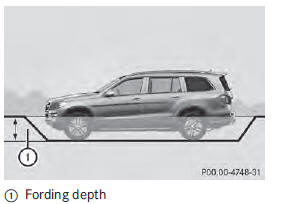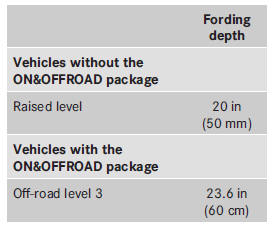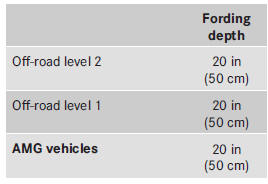Driving on wet roads
Hydroplaning
If water has accumulated to a certain depth on the road surface, there is a danger of hydroplaning occurring, even if: Х you drive at low speeds.
Х the tires have adequate tread depth.
For this reason, in the event of heavy rain or
in conditions in which hydroplaning may
occur, you must drive in the following
manner:
Х lower your speed.
Х avoid ruts.
Х brake carefully.
Driving on flooded roads
Do not drive through flooded areas.
Check the depth of any water before driving through it. Drive slowly through standing water. Otherwise, water may enter the vehicle interior or the engine compartment.
This can damage the electronic components in the engine or the automatic transmission. Water can also be drawn in by the engine's air suction nozzles and this can cause engine damage.
Vehicles with the AIRMATIC package:
set the raised level before driving through standing water.
Off-road fording
Under no circumstances should you accelerate before entering the water. The bow wave could cause water to enter and damage the engine and other assemblies.
Do not open any of the vehicle's doors while fording. Otherwise, water could get into the vehicle interior and damage the vehicle's electronics and interior equipment.



Х Establish how deep the water is and the characteristics of the body of water before fording.
R Vehicles with the AIRMATIC package:
select the highest possible vehicle level.
Х Restrict the shift range to 1 or 2.
Х Avoid high engine speeds.
Х Enter and exit the water at a flat place and at a steady walking pace.
Х Drive slowly and at an even speed through the water.
Х Do not stop.
Х Water offers a high degree of resistance, and the ground is slippery and in some cases unstable. Therefore, it is difficult and dangerous to pull away in the water.
Х Ensure that a bow wave does not form as you drive.
Х Clean any mud from the tire tread after fording.
Х Apply the brakes to dry them after fording.
See also:
Tailgate emergency release
Important safety notes
The tailgate swings upwards and to the
rear when opened. Therefore, make sure
that there is sufficient clearance above and
behind the tailgate.
Tailgate opening dimensions& ...
Floormat on the driver's side
WARNING
Whenever you are using a floormat, make sure
there is enough clearance and that the
floormat is securely fastened.
The floormat should always be securely
fastened using the fastening eq ...
Charging the battery
WARNING
During charging and jump-starting, explosive
gases can escape from the battery. There is a
risk of an explosion.
Particularly avoid fire, open flames, creating
sparks and smoking. Ensur ...
